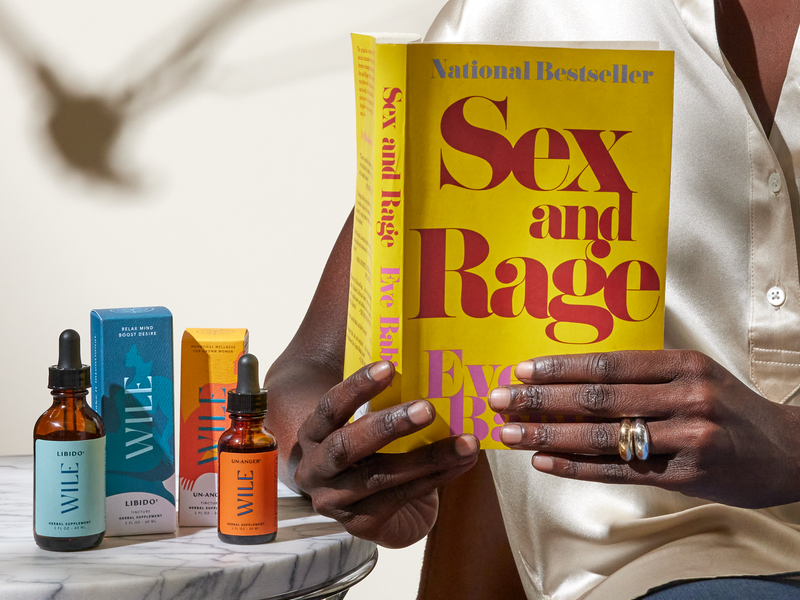It’s Not a Phase: 5000 Years of History Can’t Be Wrong
Think back to what was going on around 3000 BCE. Refresher: Sumerians were just starting to establish cities. The first Egyptian pyramid was about to be built. Stonehenge’s earliest iterations were erected. And Chinese and Indian physicians were prescribing ginger.
5000 years later, there’s more data than ever about ginger’s medicinal properties. Ginger can improve mood, rev up your brain, soothe your stomach and more. Find out why it’s especially important for women’s health after 40.
Why We Love Ginger
We love when ingredients for women’s health are accessible and familiar. Our Stave the Crave herbal chai supplement is one way to reap ginger’s health rewards, but you can also buy it fresh at any grocery store. Add it to smoothies, juices, baked goods, stir fries and whatever your health desires.
Key Benefits:
Improves Mood - Ginger is a powerful ingredient in mood supplements because it offers natural stress relief. You’re not stress eating when you’re not stressed, which makes ginger a crucial part of our Stave the Crave chai. Animal studies with ginger extract have shown that it can increase dopamine and serotonin levels, which are closely connected to emotional well-being. Clinical trials comparing ginger to a common antidepressant, diazepam, have found that ginger has similar benefits with no side effects.
Another theory about how ginger works in women’s stress supplements is that it may help decrease inflammation in and around the brain. Many scientists believe this type of inflammation may contribute to depression and fatigue, which is one link to ginger’s reported mood-enhancing benefits.
Boosts Cognition - Forgot what you came into the room for? Shifting hormones can cause brain fog in women over 40, but ginger can help. Randomized clinical trials found that women taking ginger experienced better working memory than that placebo group.
Scientists are also looking into ginger’s potential effects in helping to prevent dementia and Alzheimer’s risk. Alzheimer’s impacts twice as many women as men.
Improves Metabolism - Ginger can speed up metabolism, which is another point in its favor as part of our Stave the Crave herbal chai powder. If you know you tend to stress eat or mindlessly snack, the ginger in Stave the Crave can help your body process food and relieve unpleasant over-full feelings.
Relieves Nausea & Stomach Ache - Ginger is famous for its stomach-soothing properties.The current scientific explanation is that ginger eases queasiness by blocking serotonin receptors in the stomach lining and speeding up digestion.
Eases Period Cramps - No one told us that women over 40 often experience intensified period pain. Ginger can help ease period cramps. Clinical trials have even found it comparable to ibuprofen and other common pain relievers in relieving period pain.
Traditional Uses:
Physicians across Asia have been growing ginger for over 5,000 years. It was important in early trade and made its way to the Roman Empire around 2000 years ago, where it was also used medicinally.
In Traditional Chinese Medicine, ginger is prescribed for:
- Digestion and irritable bowel syndrome
- Arthritis
- Improved Qi
- Weight loss
Ayurvedic medicine uses ginger to treat:
- Stomach ache
- Poor digestion
- Arthritis and joint pain
Traditional Iranian Medicine has used ginger for:
- Digestion
- Relieving gas
- Liver support
- Cognition and memory
About the Plant:
Ginger is native to China, but it has long been cultivated in India, as well. The medicinal compounds and delicious flavor come from lumpy yellow rhizomes, which are like underground stems. Ginger grows bright green, grass-like leaves and reddish pink flowers that are shaped a little like pinecones on straight stalks.
Found In (Wile Products):
- Stave the Crave stress relief chai
Things to Know about Ginger:
Ginger is incredibly safe, but it’s worth checking in with your doctor before taking it if you have a blood disorder or are on blood thinners, or if you have a heart condition, diabetes or gallstones.
The consensus is that ginger is safe for pregnant and breastfeeding people, but we always recommend discussing the use of any supplement or medication with your doctor.
Clinical Research
- Bano, Samina, Humaira Sharif, and Abdulla A.-b. Badawy. “Effects of Oral Administration of an Aqueous Ginger Extract on Anxiety Behavior and Tryptophan and Serotonin Metabolism in the Rat.” Asian Journal of Medical Sciences 12, no. 6 (June 1, 2021): 38–43. https://doi.org/10.3126/ajms.v12i6.34480.
- Crichton, Megan, Alexandra Davidson, Celia Innerarity, Wolfgang Marx, Anna Elizabeth Lohning, Elisabeth Isenring, and Skye Marshall. “Orally Consumed Ginger and Human Health: An Umbrella Review.” The American Journal of Clinical Nutrition 115, no. 6 (February 11, 2022): 1511–27. https://doi.org/10.1093/ajcn/nqac035.
- Chen, Chen, Bruce Barrett, and Kristine L. Kwekkeboom. “Efficacy of Oral Ginger (Zingiber Officinale) for Dysmenorrhea: A Systematic Review and Meta-Analysis.” Evidence-Based Complementary and Alternative Medicine 2016 (May 5, 2016): 1–10. https://doi.org/10.1155/2016/6295737.
- Chen, Jaw-Chyun, Li-Jiau Huang, Shih-Lu Wu, Sheng-Chu Kuo, Tin-Yun Ho, and Chien-Yun Hsiang. “Ginger and Its Bioactive Component Inhibit Enterotoxigenic Escherichia Coli Heat-Labile Enterotoxin-Induced Diarrhea in Mice.” Journal of Agricultural and Food Chemistry 55, no. 21 (September 20, 2007): 8390–97. https://doi.org/10.1021/jf071460f.
- Fadaki, Fatemeh, Mehrdad Modaresi, and Ilnaz Sajjadian. “The Effects of Ginger Extract and Diazepam on Anxiety Reduction in Animal Model.” Indian Journal of Pharmaceutical Education and Research 51, no. 3s (July 25, 2017): s159–62. https://doi.org/10.5530/ijper.51.3s.4.
- Khodaie, Laleh, and O Sadeghpoor. “Ginger From Ancient Times to the New Outlook.” Jundishapur Journal of Natural Pharmaceutical Products 10, no. 1 (January 17, 2015). https://doi.org/10.17795/jjnpp-18402.
- Lee, Chieh-Hsin, and Fabrizio Giuliani. “The Role of Inflammation in Depression and Fatigue.” Frontiers in Immunology 10 (July 19, 2019). https://doi.org/10.3389/fimmu.2019.01696.
- Lim, Soonmin, Minho Moon, Hyein Oh, Seung-Woon Rha, Sun Yeou Kim, and Myung Sook Oh. “Ginger Improves Cognitive Function via NGF-Induced ERK/CREB Activation in the Hippocampus of the Mouse.” Journal of Nutritional Biochemistry 25, no. 10 (October 1, 2014): 1058–65. https://doi.org/10.1016/j.jnutbio.2014.05.009.
- Ozgoli, Giti, Marjan Goli, and Fariborz Moattar. “Comparison of Effects of Ginger, Mefenamic Acid, and Ibuprofen on Pain in Women with Primary Dysmenorrhea.” Journal of Alternative and Complementary Medicine 15, no. 2 (February 23, 2009): 129–32. https://doi.org/10.1089/acm.2008.0311.
- Rad, Hajar Adib, Zahra Basirat, Fatemeh Bakouei, Ali Akbar Moghadamnia, Soraya Khafri, Zeynab Farhadi Kotenaei, Maryam Nikpour, and Somayeh Kazemi. “Effect of Ginger and Novafen on Menstrual Pain: A Cross-over Trial.” Taiwanese Journal of Obstetrics & Gynecology 57, no. 6 (December 1, 2018): 806–9. https://doi.org/10.1016/j.tjog.2018.10.006.
- Saenghong, Naritsara, Jintanaporn Wattanathorn, Supaporn Muchimapura, Terdthai Tong-Un, Nawanant Piyavhatkul, Chuleratana Banchonglikitkul, and Tanwarat Kajsongkram. “Zingiber OfficinaleImproves Cognitive Function of the Middle-Aged Healthy Women.” Evidence-Based Complementary and Alternative Medicine 2012 (January 1, 2012): 1–9. https://doi.org/10.1155/2012/383062.
- Shirvani, Marjan Ahmad, Narges Motahari-Tabari, and Abbas Alipour. “The Effect of Mefenamic Acid and Ginger on Pain Relief in Primary Dysmenorrhea: A Randomized Clinical Trial.” Archives of Gynecology and Obstetrics 291, no. 6 (June 1, 2015): 1277–81. https://doi.org/10.1007/s00404-014-3548-2.
Sources:
- Ahmed, Sarah. “The Mighty Ginger Root And Your Mental Health,” April 29, 2021. https://www.wellnest.ca/post/the-mighty-ginger-root-and-your-mental-health.
- Alban, Patrick, DC. “How to Increase Blood Flow to the Brain.” Be Brain Fit, March 6, 2023. https://bebrainfit.com/increase-blood-flow-brain/.
- Alban, Patrick, DC. “Surprising Mental Health Benefits of Ginger.” Be Brain Fit, February 9, 2022. https://bebrainfit.com/ginger-health-benefits/.
- Beasley, Elizabeth, and Nancy LeBrun. “11 Proven and Possible Health Benefits of Ginger.” Edited by Marie Lorraine Johnson. Healthgrades, May 12, 2022. https://www.healthgrades.com/right-care/food-nutrition-and-diet/health-benefits-of-ginger.
- Benzie, Iris F. F., and Sissi Wachtel-Galor. Herbal Medicine: Biomolecular and Clinical Aspects, Second Edition. CRC Press, 2011.
- Bilodeau, Kelly. “Sleep, Stress, or Hormones? Brain Fog during Perimenopause.” Harvard Health, April 9, 2021. https://www.health.harvard.edu/blog/sleep-stress-or-hormones-brain-fog-during-perimenopause-202104092429.
- “Ginger in Ayurveda: Benefits & Uses Maharishi AyurVeda,” n.d. https://mapi.com/blogs/articles/ginger-an-ayurvedic-medicine-chest#:~:text=Ayurvedic%20uses%20for%20ginger,and%20better%20elimination%20of%20wastes.
- La Forge, Tiffany. “7 Everyday Tonics That Help Your Body Adjust to Stress and Anxiety.” Healthline, June 11, 2018. https://www.healthline.com/health/food-nutrition/drinks-for-stress-anxiety.
- Leech, Joe. “11 Proven Health Benefits of Ginger.” Healthline, March 18, 2021. https://www.healthline.com/nutrition/11-proven-benefits-of-ginger.
- TCM World. “Ginger: An Ancient Remedy,” March 12, 2023. https://www.tcmworld.org/ginger-ancient-tcm-remedy/#:~:text=Ginger%20is%20the%20number%20one,and%20get%20stagnating%20Qi%20flowing.
This article is intended for informational purposes and is not intended to replace a one-on-one medical consultation with a professional. Wile, Inc researches and shares information and advice from our own research and advisors. We encourage every woman to research, ask questions and speak to a trusted health care professional to make her own best decisions.




